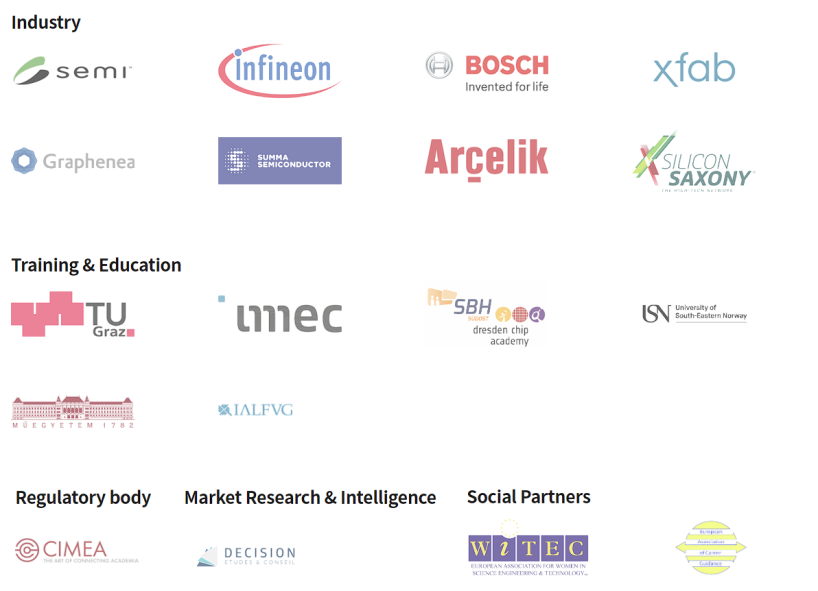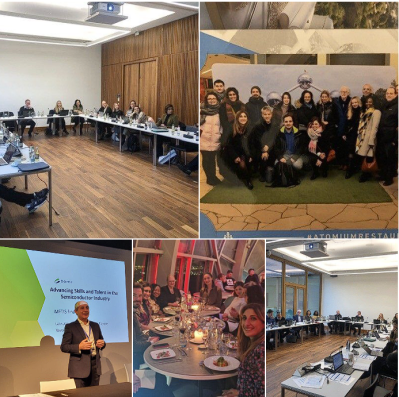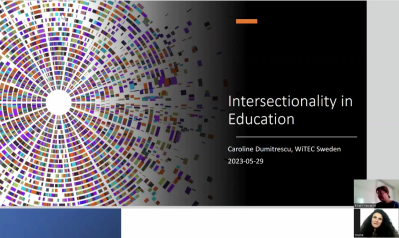METIS – MicroElectronics Training, Industry and Skills

METIS4Skills Final Event in Brussels 29-30 november
As we fondly look back on the recently concluded METIS project, we're excited to highlight the impactful contributions made by WiTEC SWEDEN, with the dynamic representation of Ema Krcic and Anca Dumitrescu at the final event.
Beyond our ongoing efforts, WiTEC proudly crafted a concise course titled ''Intersectionality in Education,'' tailored for educators, standing alongside courses from our esteemed European partners.
Our focus has been to delve into the gender and intersectionality dimensions of employability within the microelectronics sector. We are determined to bridge the gender gap and contribute to a more inclusive industry.
We express our utmost pride and joy in being a part of this vital initiative!
Thank you to all partners for the seamless collaboration and the vibrant atmosphere that permeated the entire project. We eagerly anticipate crossing paths again in future endeavors. Until then, let's celebrate the success of METIS4Skills and the strides made toward a more diverse and skilled microelectronics landscape.
WiTEC's course 'Intersectionality in Education'
In addition to its contributions so far, WiTEC Sweden has also created a short course 'Intersectionality in Education', aimed at educators, which is published on the European platform for education https://skills-framework.eu together the courses of all the other European partners.
We aimed to explore the gender and intersectionality dimension of employability in the microelectronics sector to help bridge the gender gap.
After successful completion of this course, students should be able to:
- Know what intersectionality is
- Understand intersectional methods - investigation and practice
- Be aware of the pedagogical myths and their consequences in education
- Try to understand how socio-historical, socio-political and socio-cultural factors create gender differences and how they can interrupt faulty patterns in their teaching and programming
- Identify how inclusion can sometimes go wrong
- Resist categorizing or encourage self-categorization among students, unless they are partially or completely lacking in some of the visual, auditory or kinesthetic abilities - Develop
better plans that take consider the complexity of individuals and offer better policies that come closer to the desired effects
- Be aware of lecturers' own influence on student performance and motivation
- Practice inclusive teaching
METIS Consortium Meeting
Posted by Maria Daniela Perez on February 15, 2023
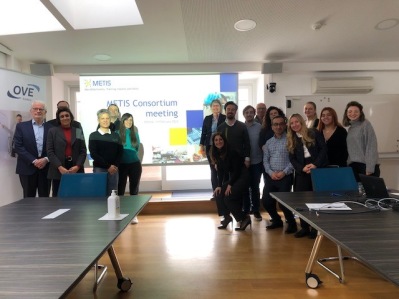
The consortium met on February 14 at the OVE (Österreichischer Verband für Elektrotechnik). There was an opening presentation by Peter Reichel, Secretary General, then the meeting kicked off with METIS content and updates.
The event was followed by a networking dinner.
WiTEC Sweden was represented by Anca Dumitrescu, our project manager and Ozana Jaurelius, our project administrator.
2022-11-01
Gender Diversity in the European Semiconductor Industry Survey
SEMI Europe is conducting its first Gender Diversity in the European Semiconductor Industry Survey, which aims to collect gender workplace data from European semiconductor companies.
Why is it important to understand gender workplace information?
Studies reveal that female representation in leadership positions is directly correlated to greater levels of both corporate innovation and profitability.
The survey aims to measure gender equality progress within the European semiconductor industry in order to implement better actions and plans to have a more diverse workforce.
Companies can use the report data to benchmark their own progress and implement programs to close gender equity gaps within their organizations.
It is recommended that an HR or marketing representative compiles and submit the survey. The survey focuses on European companies. If you are submitting global data, please specify in the survey.
Survey Preview Available! Make sure to have all the information needed before starting the survey, and explore the survey preview.
Only one survey should be completed per company.
The results will be anonymized, and the general data analytics and recommendations for continuous improvement in the industry will also be compiled in a report and made available online on SEMI European Diversity, Equity, and Inclusion Initiatives.
Submit the Survey here.
2021-12-15
Competitiveness in microelectronics
Microelectronics are an essential component of virtually all aspects of our daily lives. Advanced skills of designing and manufacturing microelectronics components and systems are becoming of strategic importance to Europe. The microelectronics sector in Europe is responsible directly 200,000 and indirectly 1,000,000 high-skilled jobs and the demand for new skills is unceasing.
Two notable disruptions make it imperative for EU to advance its competitiveness in microelectronics:
1. Emergence of Artificial Intelligence (AI), its impact on how data will be processed, analysed and shared. We are entering an era of connected intelligence that will make new demands on microelectronics technology due to its capabilities used to sensor, process, and store data for AI uptake
2. Increased recognition of microelectronics as an essential strategic technology with huge impact at both geo-economic and political levels due to the relevance of microelectronics in critical areas such as automotive, energy, aerospace, healthcare, defence, telecom and data centres.
In this context, the purpose of METIS is to contribute to the competitiveness of EU microelectronics industry by addressing the shortcomings in education & training, skills and employability with a focus on paving the way for EU leadership in data driven technologies such AI, which generates unprecedented opportunities that go beyond market dynamics and job creation, and encompass issues related to security and digital-sovereignty. Without an up-to-date microelectronics skills-base, Europe will not be able to take a leading position in digital economy and face critical challenges.
METIS will develop concrete solutions to promote mobility of vocational students, jobseekers and trainees across Europe in the sector, capitalising on the use of existing EU tools.
All partners contribute to the development of the Skills Strategy, the Long-Term Action Plan and the establishment of the Observatory and Skills Council: the complementarities brought about by the diversity of the partners allow METIS to capture the various facets affecting skills, jobs and competitiveness of the European microelectronics sector.
WITEC
WiTEC, the European Association for Women in Science, Engineering and Technology, is a European association with a history of promoting studies and activities related to empowering and increase the number of women in the field of STEM – Science, Technology, Engineering and Mathematics.
WiTEC is a METIS partner that has been strongly encouraged by the educational and industrial partners to ensure that the project reaches out – and is able to involve – the cohort of women as well as youth. SEMI Europe (the applicant) and industry partners want to make sure that METIS is a “gender informed” and “gender concerned” project that addresses one of the most pressing needs of the sector: unlocking the potential of the female workforce that is currently not capitalised upon in the sector. Microelectronics is a “male-dominated” sector, with female participation as low as 10% in certain comparts. Moreover, the challenge for microelectronics is to portray the sector as a “sector of choice” and a good career choice for young and female cohorts.
WiTEC will proactively participate in all project activities to ensure that the gender (and youth) dimension is represented in all the facets of project implementation, METIS activities and products.
Moreover, a considerable role of WiTEC is envisaged in dissemination and exploitation, in which P18 will mobilise its network to provide the widest visibility and impact of METIS.
WiTEC has consolidated experience in the management of EU funded projects and will provide all the technical, operational and managerial support for the smooth implementation and reporting of the METIS Project.
2021-12-15
Microelectronics means competitiveness
Microelectronics is an important component in all aspects of our daily lives. Therefore, knowledge of designing and manufacturing microelectronic components and systems becomes of strategic importance for Europe.
The microelectronics sector in Europe is directly responsible for 200,000 and indirectly 1,000,000 highly qualified jobs and the demand for new skills is increasing.
Two notable disruptions make it imperative for the EU to advance its competitiveness in microelectronics:
1. The rise of artificial intelligence (AI) and its impact on how data will be processed, analyzed and shared. We are entering an era of connected intelligence that will place new demands on microelectronics technology due to its capabilities used to sensor, process and store data for AI acquisition 2. Increased
recognition of microelectronics as a key strategic technology with huge impact at both geo-economic and political levels due to the relevance of microelectronics in critical areas such as automotive, energy, aerospace, healthcare, defense, telecom and data center.
The purpose of METIS is to contribute to the competitiveness of the EU's microelectronics industry by creating adequate training and increasing competence and employability in the field. Without an updated competence base in microelectronics, Europe will not be able to take a leading position in the digital economy and face critical challenges.
METIS will develop concrete solutions to promote the mobility of vocational students, jobseekers and trainees across Europe in the sector, making use of existing EU tools.
Links to registration and more information about the event can be found on WiTEC SWEDEN's Facebook and LinkedIn.
Are you also having difficulty finding skilled labor in the microelectronics sector?
We would like to introduce you to the METIS project and invite you to support our free educational catalog.
METIS focuses on identifying the most needed but hard-to-find or missing skills and related job profiles in the microelectronics sector by developing sector competence. Based on this strategy, METIS partners developed an appropriate catalog of free trainings to address the skills gaps in the microelectronics sector. These courses are specifically designed to provide specific continuing education in critical areas of microelectronics.
Help bridge the talent gap by endorsing the METIS Catalog of Training!
Please sign our letter of support ✒HÄR
You can find additional information about the METIS (MicroElectronics Training, Industry and Skills) EU-funded Erasmus+ project including our previous analysis of the skills gap in the EU microelectronics ecosystem on our website: https://www.metis4skills.eu/
The main results of the METIS project are:
• Catalog of training courses: https://www.metis4skills.eu/modules/
• An EU-wide database of more than 100 relevant training courses : https://skills-framework.eu/
Furthermore, in our latest webinar, we showcased the METIS catalog of training courses, real-life success stories from training and education providers, and the long-term opportunities that METIS resources offer. You can access the webinar recording here: https://vimeo.com/831518632
Together, let's create a more competitive and prosperous future for microelectronics in Europe!
Kind regards,
WiTEC Sweden on behalf of the METIS consortium
2020-12-16
The METIS project engages
The METIS project is now in its 14th month. A wide range of experts from all over Europe, representing all areas of microelectronics, have carried out the various processes.
At the annual meeting, which was held digitally, the progress of the partner organizations during the year was agreed upon. Experiences were shared and plans were made for the next steps in the project. Some of the METIS project's results in 2020 are available on the project's website: https://www.metis4skills.eu/category/news/
- Metis SV.pdf 419 KB
2020-10-16
SURVEY
We need your help in mapping the future needs of the microelectronics industry!
WiTEC SWEDEN is the only Swedish operation involved in shaping the microelectronics industry of the future in Europe. The METIS project is tasked with developing the strategic supply of skills within the industry and thereby improving Europe's competitiveness. The initiative has been taken by the organization SEMI, which works to promote interest in global electronics design and its manufacturing chain, involving both leading companies and universities.
WE ARE NOW ASKING for your input by answering this survey. The questions are in English and take 10-20 minutes to answer. Link to the survey.
2020-05-05
INVITATION TO FOCUS GROUP
Metis invites you to participate in our focus group “Diversity in Electronics, the place of women and other underrepresented groups in the micro-electronics industry"
For further information you can visit
http://www.metis4skills.eu/
KICK-OFF 18-19 NOVEMBER
IN VILLACH, AUSTRIA
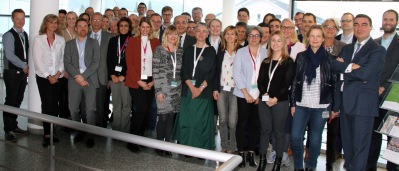
Ingrid Thuresson and Mia Norling represented WiTEC at the start of the project. It was two days filled with workshops, discussions and new contacts with the other 19 partners
- METIS_Overview (1).pdf 1.5 MB
Press Release
BRUSSELS – November 19, 2019
SEMI and 19 partners from 14 countries today launched an initiative to fill the skills gap and increase workforce diversity by strengthening collaboration between the microelectronics industry and the education sector. The project, called METIS - Microelectronics Training, Industry and Skills - will focus on skills and related training needed to support emerging industry verticals such as artificial intelligence (AI), autonomous driving and Industry 4.0.
METIS is a Sector Skills Alliance co-funded by the Erasmus+ program and is designed to overcome the skills gap in the electronic components and systems value chain. Under METIS, the project owner SEMI and the partner organizations, including WiTEC SWEDEN, will establish a Microelectronics Observatory and Skills Council consisting of representatives from industry, academia, non-governmental organizations, think tanks and authorities.
The consortium will develop a new skills strategy for the microelectronics industry in Europe with a focus on raising occupations and skills critical to the future of the sector.
The project will develop web-based learning and work-based learning in microelectronics design and manufacturing. METIS will also promote workforce diversity in the sector and target increased participation of underrepresented groups in microelectronics education and employment. METIS, a four-year project, will receive €4 million in public funding to be invested in microelectronics workforce development in Europe.
"The talent shortage is one of the most difficult issues challenging SEMI members today," said Laith Altimime, president of SEMI Europe. "We are excited to partner with leading companies and universities from across Europe to help build the robust talent pipeline critical to microelectronics innovation and growth."
"Digitalization is the most important opportunity for the knowledge-based economy of our time, especially for Europe, and semiconductor solutions are important drivers of digitalization," says Dr. Sabine Herlitschka, CEO of Infineon Technologies Austria AG, member of the METIS consortium. "Therefore, microelectronics offers very attractive job opportunities at the forefront of research and applications that are relevant to us all. With this project, we need to convey this enthusiasm for technology to more young talents, especially women. An effective way to do that is by strengthening cooperation between the industry and the education sector. This is a strategic core of our new METIS project.”
Sector Skills Alliances work to improve knowledge of skills and provide a clear strategy in a target sector through a two-pronged approach to identify existing or emerging sector-specific labor market needs and improve the responsiveness of the education sector to industry needs. Sector skills alliances are established to facilitate cross-border certification and therefore facilitate professional mobility and increase the recognition of qualifications at European level within a sector.
The METIS consortium consists of SEMI, Infineon, Bosch, X-Fab, Graphenea, Summa, Arcelik, Silicon Saxony, Imec, Graz University of Technology, Dresden Chip Academy, University of Southeast Norway, Sofia University of Technology, Budapest University of Technology and Economics, Innovation learning work, Fast Track in Information Technology, European Association of Career Guidance, European Association for Women in Science, Engineering and Technology (WiTEC SWEDEN), CIMEA and Decision.
METIS Project Manager for WiTEC SWEDEN
Anca Dumitrescu
Phone: +46 702 30 919 19
Email:ancamdu@gmail.com
METIS kontaktinformation
Emir Demircan
Director SEMI Europé
Phone: +32 (0) 2 609 53 18
Email:
www.semi.org/eu
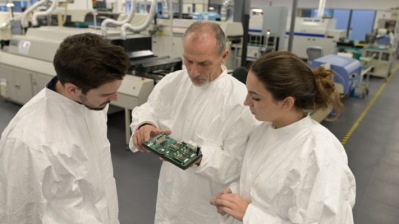
METIS PARTNERS
